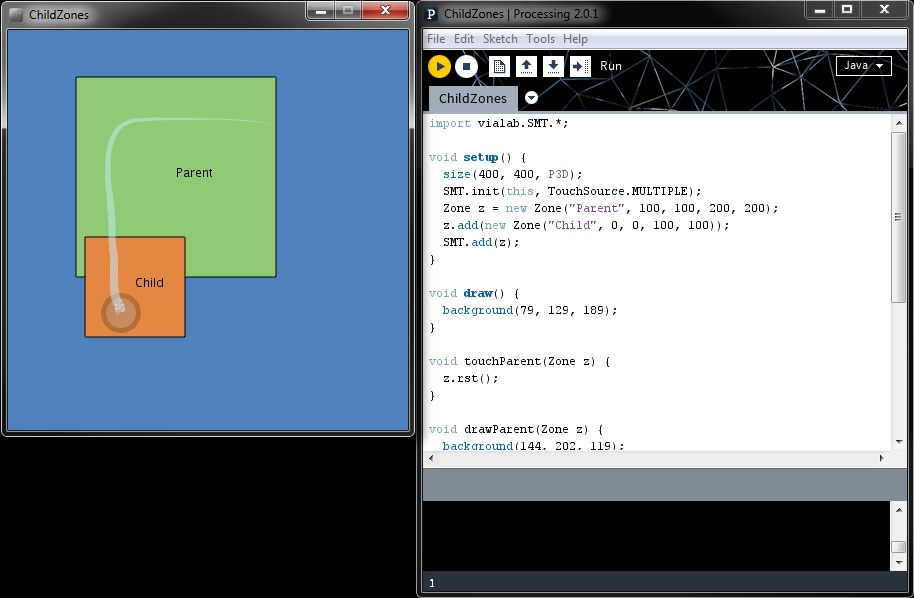
Contributors:
Erik Paluka, Zachary Cook, Mark Hancock, and Christopher Collins
While multi-touch computing becomes more common, there comes a requirement for students to learn how to create software for multi-touch environments. Although there are many powerful toolkits that exist already, they require a strong programming background and thus become difficult to integrate into fast-paced human-computer interaction (HCI) courses or for non-CS students to use. Researchers at the University of Ontario Institute of Technology (UOIT) and the University of Waterloo (UW) have developed a toolkit with a simplified API called the Simple Multi-Touch Toolkit (SMT).
Based around the concept of touch-enabled zones, SMT is built as a library for the popular processing platform or as a standalone Java library. By integrating with Processing’s simplified syntax, SMT makes prototyping multi-touch applications fast and easy. SMT natively supports TUIO and works on Windows Touch but also provides a multi-touch simulator to support non-touch enabled environments. While SMT was designed to support students and used in undergraduate HCI courses at both UOIT and UW in experimenting with multi-touch input, SurfNet researchers have also used SMT to develop several applications.
The project’s main website is located here at http://vialab.science.uoit.ca/smt/
Check out our GitHub Repository for source code related to this project.
Publications
-

K. Sikes, Z. Cook, E. Paluka, M. Hancock, and C. Collins, “The Simple Multi-Touch Toolkit,” in SurfNet: Designing Digital Surface Applications, F. Maurer, Ed., Calgary: NSERC SurfNet, 2016, pp. 256-273.
@incollection{sikes2016a,
author = {Kalev Sikes and Zachary Cook and Erik Paluka and Mark Hancock and Christopher Collins},
title = {The Simple Multi-Touch Toolkit},
editor = {Frank Maurer},
booktitle = {SurfNet: Designing Digital Surface Applications},
publisher = {NSERC SurfNet},
address = {Calgary},
year = 2016,
pages = {256–273}
} -

Z. Cook, “The Simple Multi-Touch Toolkit,” UOIT Student Research Showcase, 2013.
@poster{coo2013a,
author = {Zachary Cook},
title = {The Simple Multi-Touch Toolkit},
booktitle = {UOIT Student Research Showcase},
year = 2013
} -

E. Paluka, “Simple Multi-Touch: A framework for teaching multi-touch computing,” UOIT Student Research Showcase, 2011.
@poster{pal2011a,
author = {Erik Paluka},
title = {Simple Multi-Touch: A framework for teaching multi-touch computing},
booktitle = {UOIT Student Research Showcase},
year = 2011
}


